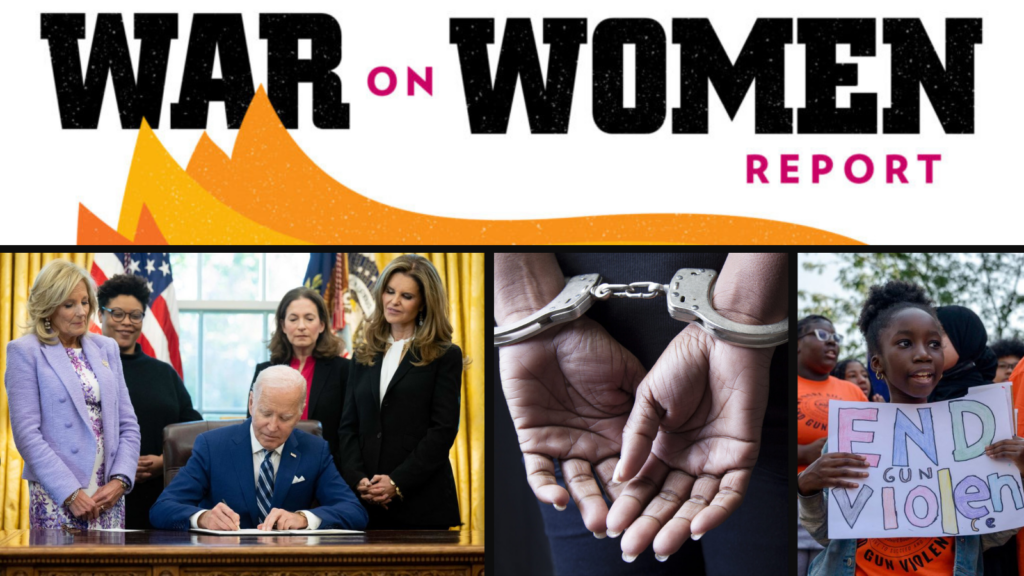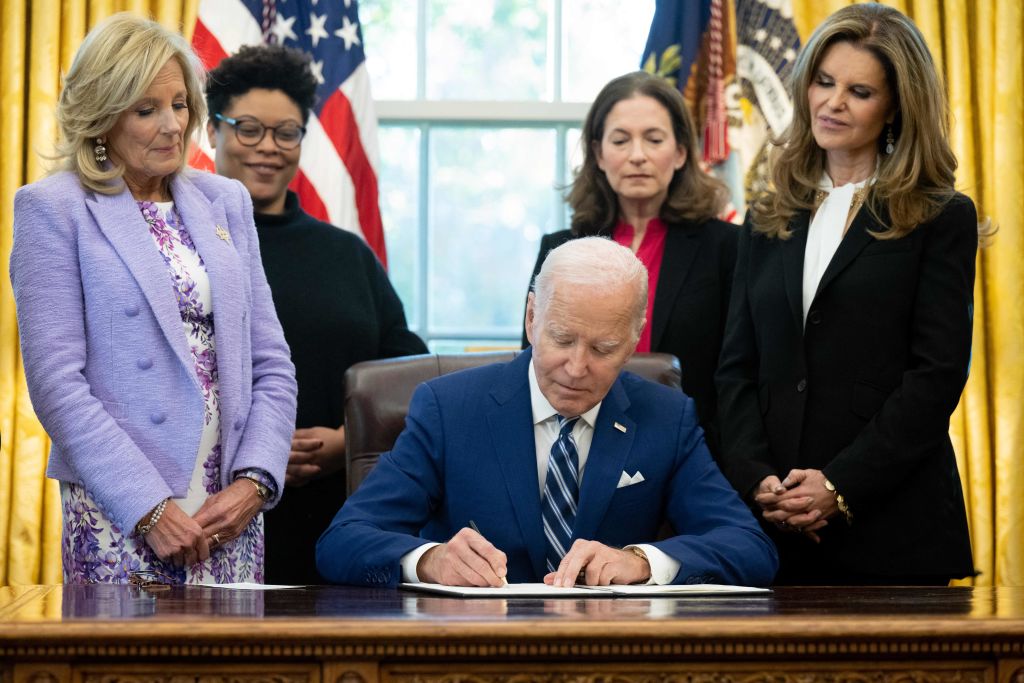
U.S. patriarchal authoritarianism is on the rise, and democracy is on the decline. But day after day, we stay vigilant in our goals to dismantle patriarchy at every turn. The fight is far from over. We are watching, and we refuse to go back. This is the War on Women Report.
Since our last report…
+ Trump signaled intentions for an aggressive agenda if he wins the 2024 presidential election. He has:
- hinted that the military will have a larger presence in the U.S., though plans are unspecified.
- suggested widespread deportations.
- proposed imposing travel bans on countries with Muslim-majority populations.
+ Abortion rights advocates won major victories in Ohio, Virginia and Kentucky. These recent polls show that support for abortion rights is rising in popularity across party lines, even exceeding Biden’s 2020 vote share in red and blue counties. Veronica Ingham, the campaign manager of Ohioans For Reproductive Freedom, told reporters, “Voters last night made it clear that this is not a partisan issue.”
+ Despite vowing to center climate change action throughout his term, President Biden has opted not to participate in COP 28, the prominent annual global climate conference. While no reason was given for his absence, indications suggest that the Israel-Gaza war and his reelection campaign are commanding his attention.
+ Recent data suggests that among all states, West Virginia has the highest rate of workplace sexual harassment followed by Kansas, Missouri and Alabama. Despite this, West Virginia has experienced an 82 percent decrease in filed charges since last year.
Let’s not forget what else was thrown our way last month.
Wednesday, Nov. 1
+ New Jersey Governor Phil Murphy closed part of the state’s only women’s prison, Edna Mahan Correctional Facility, after claims of sexual abuse and misconduct. The decision to close the 110-year-old facility was made in June 2021. The facility is facing a half dozen lawsuits, several legislative hearings and media investigations for claims of sexual and physical violence, and a federal civil rights inquiry, in which the Department of Justice determined that officers groped prisoners during searches, called them slurs, and pressured them into sexual situations. Among their findings, they saw that camera coverage was inconsistent throughout the facility, and even nonexistent in some areas. One of these areas was the storage room, where they found a mattress on the floor, indicating sexual violence in non-surveiled areas.

All 176 women in the closed part of the facility have been relocated temporarily. The state is planning the construction of a new women’s prison.
Thursday, Nov. 2
+ The U.S. Department of Labor released sample employment agreements designed for domestic workers such as nannies, house cleaners and home-care workers. While domestic workers don’t need to use these agreements, they are available as a tool to help workers and employers establish a clear understanding of working conditions. The release of these documents is part of Biden’s executive order to improve compensation for care workers, support family caregivers and expand affordable care options.
Tuesday, Nov. 7
+ Ohio voters passed Issue 1, a constitutional amendment to protect abortion and reproductive rights within the state. The amendment was crafted by numerous reproductive rights advocacy groups, including Ohio Physicians for Reproductive Freedom and Ohioans for Reproductive Freedom, and codified access to abortion, contraception, fertility treatment, miscarriage care, and individuals’ right to continue their own pregnancy.
“Today, Ohioans made it clear, abortion is a winning issue, and together we can do anything,” said Lauren Blauvelt, co-chair of the Ohioans United for Reproductive Rights and executive director of Planned Parenthood Advocates of Ohio.
Monday, Nov. 13
+ Jill Biden announced a new White House Initiative on Women’s Health Research. Women’s health care has consistently been underfunded for decades, and only 10.8 percent of the National Institute of Health’s funding is spent on women’s health. The initiative aims to address this by targeting research gaps related to conditions that are specific to women, predominantly affect women, or affect women differently.

The initiative will also include research on reproductive and post-reproductive healthcare. “Every woman will be affected by menopause,” Biden said, “and yet, there’s a stunning lack of information about how to manage and treat its symptoms, which can be debilitating”
“It’s a big day for every woman in this country, no matter her age, her political affiliation, her religious identity or ethnicity. This is a historic moment for women and their families and their healthcare providers,” said Maria Shriver, an actor and women’s healthcare advocate.
Wednesday, Nov. 15
+ Power to Decide released their 11th annual #ThxBirthControl Survey data, showcasing the attitudes and behaviors towards abortion healthcare of over 1,000 women between the ages of 15 and 29. Among the findings:
- 94.4 percent agree or strongly agree on the importance of using birth control during intercourse to prevent pregnancy.
- 83 percent of respondents have used birth control during their lifetime.
- While 86 percent of respondents prefer birth control information from their healthcare providers, less than 47 percent received it in the past year.
- 74 percent of respondents believe that the benefits of birth control outweigh the side effects.
- 34.5 percent of the respondents have not been informed about birth control in the past year.
- 28 percent express disagreement or strong disagreement that hormonal birth control is safe.
- 25 percent of respondents acquired birth control information from social media in the last year.
- 24 percent of respondents feel they lack adequate information to select the best birth control method for themselves.
Monday, Nov. 20
+ Trump-appointed judges on the federal appeals court ruled that only the federal government—no longer individuals and groups—can sue under Section 2 of the 1965 Voting Rights Act. Section 2 bars voting practices that show discrimination based on race, color, or belonging to specified language minority groups determined in the act. A vast majority of Section 2 lawsuits are brought by groups and individuals, playing a crucial role in safeguarding the right to vote.
This case emerged due to a lack of explicit language in the act specifying the right for groups and individuals to sue, leading to the ruling arguing that the right does not exist. This ruling applies to Arkansas, Iowa, Minnesota, Missouri, Nebraska, North Dakota, and South Dakota. It is likely to be challenged by the U.S. Supreme Court, a body that has notably limited the authority of the law in the past decade.
Tuesday, Nov. 21
+ Michigan Governor Gretchen Whitmer signed into law the Reproductive Health Act. Despite setbacks, this law makes progress in Michigan’s reproductive policy. It repeals a state law that banned higher education institutions from providing referrals to abortion services, as well as a law criminalizing healthcare professionals who prescribe abortion medication.
The move was met with mixed reactions, particularly from abortion activists. This law sought to improve reproductive rights state-wide, but it was significantly “watered down” because House Democrats did not have the support necessary without the removal of critical clauses. This is largely due to Rep. Karen Whitsett, who adamantly disagreed with the proposed ban on the 24-hour abortion waiting period. The House stripped this clause, along with key provisions for Medicaid funding for abortion care.
Saturday, Nov. 25
+ U.N. Women commemorated International Day for the Elimination of Violence Against Women by launching the campaign UNiTE: Invest to Prevent Violence Against Women and Girls. In the U.S., one in four women have been victims of severe physical violence by an intimate partner in their lifetime. UNiTE aims to mobilize all member states to increase funding for gender-based violence prevention, including greater support of care services, prevention programs, and autonomous women’s rights organizations. The campaign also aims to raise awareness about gender-based violence by inviting the public to share their thoughts and activist efforts related to the topic under the hashtag #NoExcuse.
Up next:
U.S. democracy is at a dangerous inflection point—from the demise of abortion rights, to a lack of pay equity and parental leave, to skyrocketing maternal mortality, and attacks on trans health. Left unchecked, these crises will lead to wider gaps in political participation and representation. For 50 years, Ms. has been forging feminist journalism—reporting, rebelling and truth-telling from the front-lines, championing the Equal Rights Amendment, and centering the stories of those most impacted. With all that’s at stake for equality, we are redoubling our commitment for the next 50 years. In turn, we need your help, Support Ms. today with a donation—any amount that is meaningful to you. For as little as $5 each month, you’ll receive the print magazine along with our e-newsletters, action alerts, and invitations to Ms. Studios events and podcasts. We are grateful for your loyalty and ferocity.
This post was originally published on this site be sure to check out more of their content.






